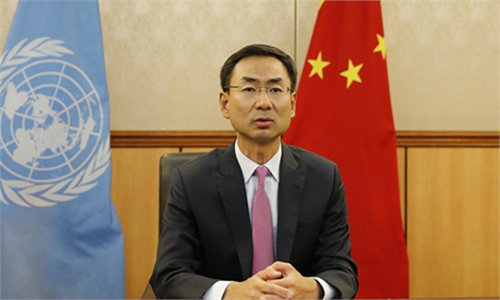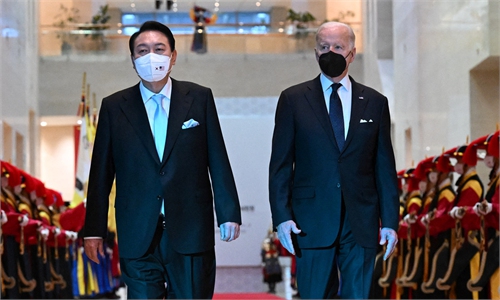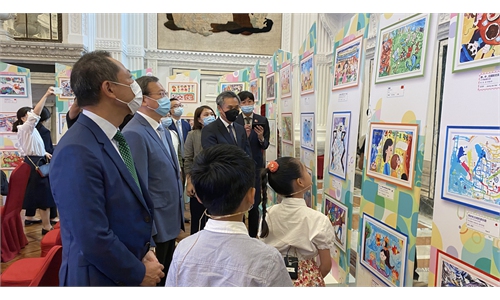S. Korea should make its own independent policy in resolving Peninsula issue rather than be subjected to US: experts

People watch a news broadcast showing a file photo of a North Korean missile test in Seoul, South Korea,at a railway station on October 9, 2022. Photo: VCG
Amid escalating tensions on the Korean Peninsula with the North firing missiles carrying mock nuclear warheads and the South conducting military drills with the US, South Korea's envoy called on China's support to resolve the issue.The Chinese Foreign Ministry responded to a question regarding the matter on Monday, saying that China will continue to play a positive role in promoting a political settlement to the issues. Meanwhile, experts urged South Korea to effectively realize that the fundamental cause for the tension is the meddling of the US, and that it should make its own independent decisions rather than be subjected to those made by Washington.
South Korean Ambassador to China Chung Jae-ho said on Sunday that South Korea is ready to strengthen strategic talks with China on resolving the Korean Peninsula issue, and expressed hope that China will play a constructive role in implementing the UN Security Council resolution and promoting the restart of denuclearization dialogue, Yonhap News Agency reported on Sunday.
South Korea will seek China's support in resolving North Korea nuclear issue peacefully through dialogue, and on developing North Korea's ties with its southern neighbor as well as with the US, the ambassador said.
The remarks came after North Korea fired two ballistic missiles into the sea on Sunday, the latest in a blitz of launches amid tensions over US-led military exercises in the region, Yonhap reported. The South Korean military's Joint Chiefs of Staff announced that the launches are the seventh and eighth in two weeks, according to AFP.
North Korean top leader Kim Jong-un guided the latest exercises, reported the country's state broadcaster KCNA, which involved ballistic missiles with mock nuclear warheads and led by "tactical nuclear operations units." The various tests simulated targeting military command facilities in the South, KCNA added.
"Even though the enemy continues to talk about dialogue and negotiations, we do not have anything to talk about nor do we feel the need to do so," KCNA quoted Kim as saying.
South Korean President Yoon Suk-yeol on Sunday vowed to "dramatically" reinforce the US extended deterrence and the alliance's deterrence against North Korean threats in a statement following an emergency National Security Council meeting, local media reported.
When asked about the latest moves from Pyongyang, Chinese Foreign Ministry spokesperson Mao Ning said at Monday's press briefing that China has noted the matter as well as the continuous large-scale joint military exercises by the US, Japan and South Korea.
"China's position on the issues on the Korean Peninsula remains unchanged. We will continue to play a positive role in promoting the political settlement of these issues," Mao noted.
Experts pointed out that the fundamental cause for the recent tensions on the peninsula is the joint military exercises by the US and South Korea, especially when a US aircraft carrier is involved, which was met by Pyongyang's missile launches in a tit-for-tat manner.
"The US has been implementing its Indo-Pacific strategy of suppressing North Korea and not responding to its security demands," Lü Chao, an expert on Korean Peninsula issues at the Liaoning Academy of Social Sciences, told the Global Times on Monday.
"From this perspective, South Korea should first realize the fundamental cause of the issue, have its own independent foreign policy based on its own interests, rather than converge with and be subjected to the so-called Indo-Pacific strategy of the US," Lü said.
The only way to ease tensions between the North and South is for both sides to actively engage in dialogues, resolve the issue through peaceful negotiations, and not let the US steer the wind or stir up more troubles, experts noted.
Amid an escalation of tensions on the peninsula, the US nuclear-powered aircraft carrier USS Ronald Reagan launched a new round of naval drills with South Korean warships on Friday. The Reagan and its battle group returned to the waters near the Korean Peninsula merely one week after their earlier training with South Korean navy ships, which was the first trilateral anti-submarine drills held by the US, Japan and South Korea in five years.
The reason why this request was made to China from the South Korean side is that according to Lü, China's position is in line with the fundamental demands of both the North and South, which is to seek a peaceful solution through negotiation. In addition, China has friendly and cooperative relations with both sides on the peninsula, and they believe that China is willing and able to give active support to the negotiations between two sides.



